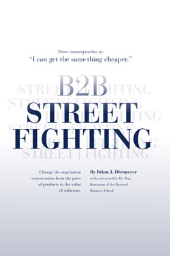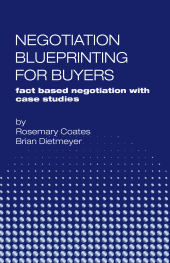In fact, after completing negotiation training, negotiators "highly effective" rating jumps to a whopping 6.8%!!! (makes you want to run right out and sign up for one of those courses advertised in the airline magazines, doesn't it?).
 Another way to look at this is that 95% of us say we are not highly effective even after negotiation training. Is that the appropriate standard for a professional sales rep or account manager in core skill of negotiation? Given our roles as B2B sales people and sales managers, why shouldn't we be highly effective at selling and negotiating?
Another way to look at this is that 95% of us say we are not highly effective even after negotiation training. Is that the appropriate standard for a professional sales rep or account manager in core skill of negotiation? Given our roles as B2B sales people and sales managers, why shouldn't we be highly effective at selling and negotiating?
Why are global sales organizations reporting such dismal negotiation effectiveness ratings? Relax, it's not entirely your fault. The real reason is that if you don't have strong intuitive skills for negotiation, the solutions to help you build up your skills are just not that good. Whether it's business schools or private consultants, strong choices for beefing up your negotiation acumen just aren't readily available.
The reason for this is that negotiation has been improperly diagnosed as a:
- soft skill
- something that is random
- highly driven by emotion and tough guy tactics
None of the above is true.
Let's look at one more fact, 85% of sales organizations say they have a sales/opportunity management process in place and only 26% say they have the same for negotiation. Why is this? Companies spend millions on sales and negotiation training each year, why is sales "sticking" and negotiation isn't?
Let's say you walk into a doctor and say your knee hurts, the doc doesn't even examine you, she simply says "I think the real problem is that you need surgery." You leave the office getting ready to schedule surgery and on the way home, one of your shoes blows out. You are walking by a sports store and go in and get good walking shoes. They put you on one of those cool new machines that automatically builds orthotics custom to your feet and you put on your new gear and walk home. Voila!!! Your knee doesn't hurt. The problem was your shoes...not your cartilage.
This is what business schools and consultants have been doing for years. Improperly diagnosing negotiation symptoms (tough buyers, price and give away pressure etc.) as "soft skills" and "random tactics." This improper diagnosis has led to prescribing solutions of long lists of tactics, personality profiles, counter tactics, 6 principles, 9 steps, tricks and tips to cover every possible random event that might happen. Don't get me wrong, every now and then one of these work...if you prescribe enough of them. It's also like Vegas, every now and then you win but on average you lose.
In fact B2B negotiation is "a business process" that "can be anticipated." It is only when we change our core fundamental belief about the root cause problem about negotiation that we can also radically shift our approach to the solution of negotiation. Today's B2B sales leader and sales professional need data. Repeatable and systematic data collection, analysis and use is the name of the game in negotiation now.
Sales consultants made the move in the mid 1980's to shift a lot of that focus on the "art" of selling to the "science" of selling. Sellers today routinely diagnose customer business needs and systematically apply their solutions to solve those business problems. Sellers today know that their job is not to sell products and services but help their customers raise throughput, increase revenues, get products to market faster, etc.
It's time for the art of negotiation to catch up to the science of selling. It's time for us to start treating business negotiation like the grown up it is.
* data comes from Think!/SAMA white paper entitled "Negotiation for Sales Effectiveness, Benchmarking Current and Best Practice." Click on the button below if you'd like to receive this white paper by email.






